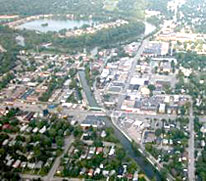
|
Broad Ripple Random Ripplings

The news from Broad Ripple
Brought to you by The Broad Ripple Gazette
(Delivering the news since 2004, every two weeks)

|
| Brought to you by: |

|

|

|

|

|

|
Editorial - BRVA Land Use meetings
posted: Mar. 06, 2025
It became evident at the most recent Broad Ripple Village Association [BRVA] Land Use and Development committee meeting that there is an issue with input from the public on proposed projects.
One proposal before the committee resulted in the petitioner being asked to return the following month, partially because of the lack of signed letters of support from the neighbors.
Another proposal, also without signed letters of support, was allowed to email the letters to the committee without returning.
Neither of these petitioners were aware of the need for such letters of support.
But, the real issue here is that of notification. A petitioner is required by the city to send notice of the project to adjoining neighbors and neighborhood associations (such as the BRVA and the Broad Ripple Gazette). That notice only tells the neighbors of the hearing that will occur at the City-County Building downtown as part of the Department of Metropolitan Development's (DMD) zoning process. This is where concerned parties, neighbors and neighborhood associations, can remonstrate (or occasionally, come to support a project).
When a petitioner files with the DMD, I believe it is suggested for them to schedule an appearance before the BRVA Land Use committee in an attempt to garner a letter of support from the BRVA.
There is no notice system for the BRVA Land Use meetings, except in a email that goes out to BRVA members. Therefore, many affected neighbors have no idea that there is a public meeting they could attend to voice concerns. (The Broad Ripple Gazette tries to publish the agenda on the Gazette's BRVA Archive page as soon as it is received from the committee. That is usually within a few hours before the meeting but can be a day or two before. We believe this is helpful, but not sufficient notification.)
I do not believe there is an list of requirements for a petitioner to present at a BRVA committee meeting. Yet at times, the petitioner is asked to show proof that the neighbors support the proposal. Other times it is merely asked of the petitioner is there is opposition, and that seems to be sufficient.
It would be an improvement to have a consistent method for notifying the neighbors and for satisfying the committee of neighbor concerns. Without a strict procedure in place there are widely varying actions from one proposal before the committee to the next.
alan@broadripplegazette.com

|

|

|
| Brought to you by: |

|

|

|
| Brought to you by: |

|

|

|
| Brought to you by: |

|

|

|
| Brought to you by: |

|

|

|


